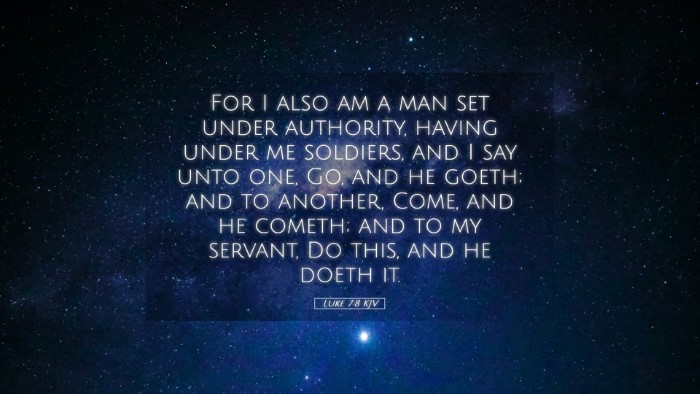Commentary on Luke 7:8
In Luke 7:8, we find a profound declaration made by a centurion regarding the authority and power of Jesus. The verse states:
"For I also am a man set under authority, having under me soldiers, and I say unto one, Go, and he goeth; and to another, Come, and he cometh; and to my servant, Do this, and he doeth it." (KJV)
Contextual Analysis
The context of this verse is crucial for understanding the centurion's faith and Jesus' response. Prior to this declaration, a centurion had a servant who was gravely ill. He sought Jesus to come and heal his servant, recognizing Jesus' authority and ability to heal. The centurion's humility and understanding of authority represent a significant teaching moment in the Gospels.
Insights from Matthew Henry
Matthew Henry emphasizes the centurion’s profound understanding of authority. He notes:
- Faith and Humility: The centurion recognized not only the authority of Jesus but demonstrated remarkable humility by approaching Him, acknowledging his own unworthiness.
- Understanding Authority: Henry points out that the centurion’s position as a soldier gave him insight into the nature of authority. He understood that the command of Jesus was not bound by distance or physical presence.
- Intercessory Faith: The centurion acted out of love and concern for his servant, reflecting the ideal of intercessory prayer—the calling upon Jesus for healing and help not only for oneself but also for others.
Insights from Albert Barnes
Albert Barnes provides a deeper theological insight into this passage:
- The Nature of Christ’s Authority: Barnes notes that the centurion’s recognition of Jesus’ authority highlights a central theme in the Gospels: all authority in heaven and earth belongs to Christ (Matthew 28:18).
- The Power of Words: The centurion illustrates the power of spoken command, akin to how God created the world through His word (Genesis 1). This reflects the creative power of Jesus’ commands.
- Contrast with Israel: In this passage, Jesus marvels at the centurion's faith, which serves as a stark contrast to the lack of faith seen among the Jews, suggesting that faith does not depend on ethnicity or religious background.
Insights from Adam Clarke
Adam Clarke offers a critical examination of the text and elucidates the implications for both the centurion and the readers:
- Comparison of Authority: Clarke emphasizes the centurion’s comparison of his own military authority to that of Jesus, illustrating that true authority stems from one's ability to command with spiritual power.
- Faith in Action: Clarke notes that the centurion’s faith is evidenced by his actions—he does not demand healing; instead, he appeals to Jesus’ authority with confidence that His word alone is sufficient.
- Gentile Faith: This passage signifies a pivotal moment where faith transcends cultural and religious boundaries, inviting the early church to recognize the universality of Jesus’ mission.
Theological Implications
The theological implications of Luke 7:8 are profound and far-reaching:
- The Authority of Christ: This verse underlines the authority of Jesus in matters spiritual and physical. It invites believers to trust fully in His power to heal and deliver.
- Nature of Faith: The centurion’s faith is a model for believers. True faith does not demand signs or wonders but rests confidently in the authority of Christ’s word.
- Inclusivity of the Gospel: Jesus' ministry is shown to extend beyond the Jewish people, welcoming Gentiles into the fold, which echoes throughout the New Testament narrative.
Practical Applications for Leaders and Scholars
For pastors, students, and theologians, this passage offers several avenues for application and reflection:
- Cultivating Faith: Examine ways to nurture a faith that trusts in Jesus’ authority, encouraging congregations to step into deeper trust and reliance on His word.
- Understanding Authority: Reflect on the nature of authority within the church and how it aligns with the model of servanthood exhibited by the centurion.
- Promoting Inclusivity: Consider how to actively include and affirm the faith of individuals from diverse backgrounds within the church community.
- Intercessory Prayer: Promote the practice of intercessory prayer, as seen with the centurion's prayer for his servant, urging congregants to bring their needs and the needs of others before the Lord.
Conclusion
The insights gleaned from Luke 7:8 shape the understanding of Jesus as Lord and Savior, confirming the authority that He exercises over life and death, healing and provision. The centurion’s faith exemplifies the kind of belief that recognizes Jesus’ power and responds in humility. As we reflect on this verse, we are challenged and encouraged to deepen our faith, recognize Christ’s authority in our lives, and extend our understanding of God's reach to all humanity.


